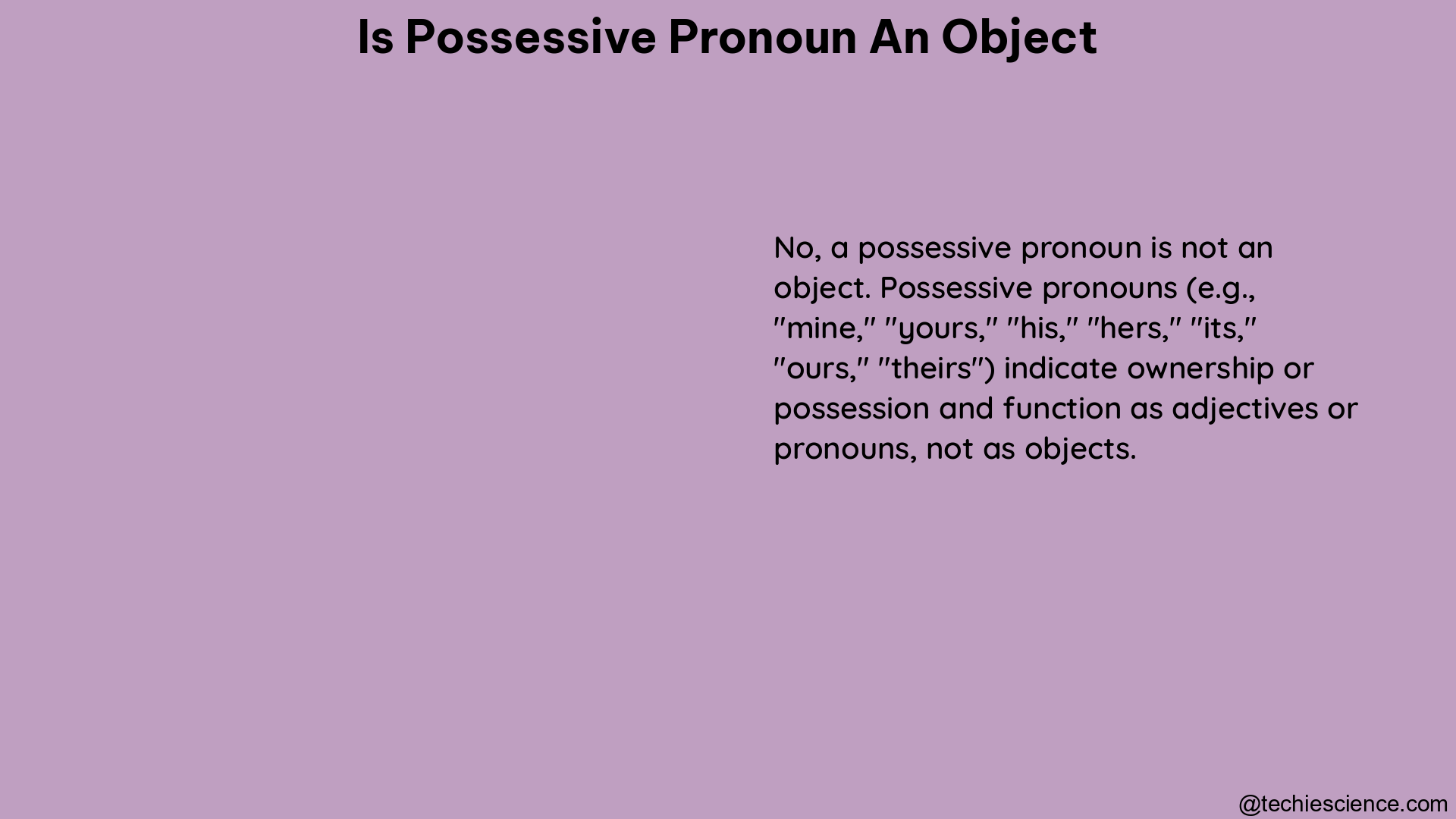The distinction between possessive pronouns and object pronouns in English grammar is a nuanced topic that requires a deep understanding. This comprehensive guide will delve into the intricacies of these two pronoun categories, their functions, and the instances where they can overlap, providing you with a thorough understanding of this grammatical concept.
Possessive Pronouns: Indicating Ownership and Possession
Possessive pronouns are a class of pronouns that indicate ownership or possession. These pronouns replace a noun that has already been mentioned or is implied in the context. The common possessive pronouns in English include:
- Mine
- Yours
- His
- Hers
- Ours
- Theirs
For example:
- “This is my car.” → “This is mine.”
- “That scarf belongs to her.” → “That scarf is hers.”
Possessive pronouns serve to replace the noun and convey the sense of ownership or possession, without the need to repeat the original noun.
Object Pronouns: Functioning as the Object of a Verb or Preposition

Object pronouns, on the other hand, are used to replace a noun as the direct or indirect object of a verb or as the object of a preposition. The common object pronouns in English include:
- Me
- You
- Him
- Her
- It
- Us
- Them
For example:
- “She told me.” (direct object)
- “He gave the book to her.” (indirect object)
- “The book is for him.” (object of a preposition)
Object pronouns are essential in constructing grammatically correct sentences, as they allow for the smooth flow of information and the avoidance of repetitive noun usage.
Overlapping Usage: Possessive Pronouns as Objects
In some instances, a single pronoun can serve both as a possessive pronoun and an object pronoun, depending on the context. This overlapping usage can be observed in the following examples:
- “Her” as both Possessive and Object:
-
“A mother takes care of her children.” In this sentence, “her” is both possessive (indicating the children belong to the mother) and an object (of the preposition “of”).
-
“The same as” with Possessive and Object Pronouns:
- “Tony has the same book as mine.” (Possessive, meaning a similar book)
- “Tony has the same book as me.” (Object, meaning the exact same book)
The context and the intended meaning of the sentence determine whether the pronoun is functioning as a possessive or an object pronoun in such cases.
Key Considerations
To summarize the key points regarding possessive pronouns and object pronouns:
- Possessive pronouns indicate ownership or possession, replacing a noun that has already been mentioned or is implied.
- Object pronouns function as the direct or indirect object of a verb or as the object of a preposition.
- Some pronouns, such as “her” and the use of “the same as,” can have both possessive and object functions, depending on the context.
Understanding the nuances of these pronoun categories is essential for effective and grammatically correct communication in the English language.
Examples and Exercises
To further solidify your understanding, let’s explore some additional examples and exercises:
- Identify the function of the pronoun in the following sentences:
- “That book is mine.”
- “She gave the gift to him.”
- “The car belongs to us.”
-
“I saw them at the park.”
-
Rewrite the following sentences using the appropriate possessive or object pronoun:
- “The book belongs to John.” → “The book is __.”
- “She spoke to the teacher.” → “She spoke to __.”
- “The flowers are from my garden.” → “The flowers are __.”
-
“The car is owned by them.” → “The car is __.”
-
Explain the difference in meaning between the following sentences:
- “The same as mine”
- “The same as me”
By working through these examples and exercises, you will deepen your understanding of the distinctions between possessive pronouns and object pronouns, as well as their overlapping usage in the English language.
Reference Links
- Is “her” a Possessive or an Objective Pronoun in “A mother takes care of her children”?
- The same as: Object or Possessive Pronoun?
- Subject, Object, and Possessive Pronouns
Hey! I am Arpita Bose Roy. My qualifications are M.A. in English with B. Ed. in both general education and special education. I have 2 years of experience as a “language analyst” at IIT Kharagpur and 4 years of experience as an “Academic Content Developer” at IIT Kharagpur. Currently, I am working as an academic writer at Lambdageeks.